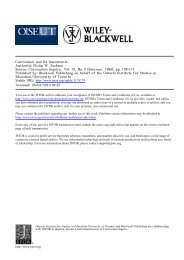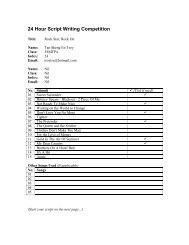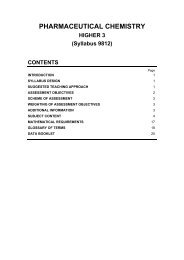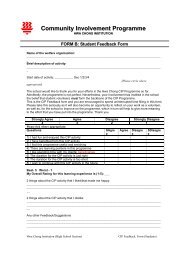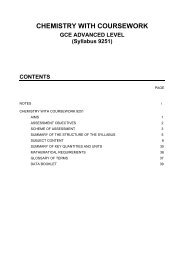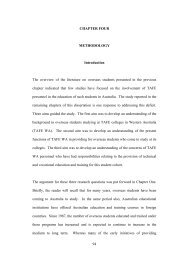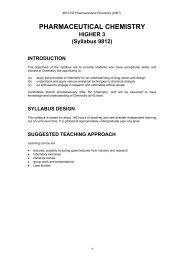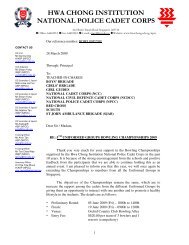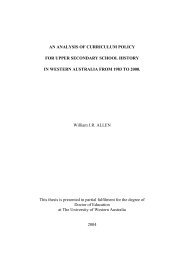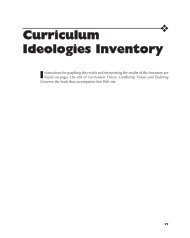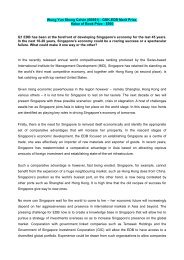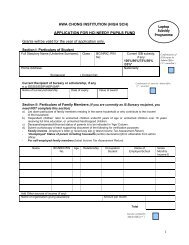Scientific Management and Weber's Bureaucracy
Scientific Management and Weber's Bureaucracy
Scientific Management and Weber's Bureaucracy
Create successful ePaper yourself
Turn your PDF publications into a flip-book with our unique Google optimized e-Paper software.
Educational Leadership<br />
Leading the Organization:<br />
<strong>Scientific</strong> <strong>Management</strong> <strong>and</strong><br />
Weber’s <strong>Bureaucracy</strong><br />
Elaine Sharplin
Choose the word or words that best describe some aspect of<br />
your organisation :<br />
•An organism, a machine, a layered cake, a social club<br />
•Decisions are made by:<br />
consensus, democratic system, executive positions<br />
or in accordance with rules <strong>and</strong> regulations<br />
•Workers are motivated by:<br />
money, peer influence, negative consequences,<br />
intrinsic motivation<br />
•Students are seen as:<br />
raw materials, inputs/outputs, individuals with<br />
personal needs, members of a class/year/peer group
EFFECTIVENESS<br />
• An action is effective if it<br />
accomplishes its specific aim.<br />
• To be effective an institution or<br />
individual must accomplish<br />
something.<br />
• The term implies deliberate action<br />
aimed at achieving a specific target.
EFFICIENCY<br />
• Efficiency involves accomplishment, but<br />
implies without waste of effort or<br />
resources.<br />
• It has value-for-money connotations.<br />
• The degree of efficiency is the extent to<br />
which resources are consumed in<br />
achieving the goal.
Take the following statements <strong>and</strong><br />
develop several scenarios which<br />
illustrate these points.<br />
a) A school can be effective but<br />
inefficient<br />
b) A school can be efficient but not<br />
effective<br />
c) A school can be effective <strong>and</strong> efficient<br />
but not necessarily excellent (in the sense<br />
of being best amongst its peers).
SCIENTIFIC MANAGEMENT<br />
Taylor developed four principles:<br />
1. <strong>Management</strong> must analyze work practices using time <strong>and</strong> motion<br />
studies<br />
2. Workers should be carefully selected, trained <strong>and</strong> paid to do a<br />
good job<br />
3. Workers <strong>and</strong> managers must cooperate for the new management<br />
principles to succeed<br />
4. Planning must be separated from the completion of the task.<br />
Planning includes the creation of a suitable work environment
Henri Fayol (1841-1925)<br />
Managerial activity consists of five<br />
elements:<br />
– planning,<br />
– organizing,<br />
– comm<strong>and</strong>ing,<br />
– coordinating,<br />
– controlling.
Managers needed to<br />
possess certain qualities<br />
1. Physical qualities - vigour, good health<br />
2. Mental qualities - underst<strong>and</strong>ing, judgement,<br />
adaptability<br />
3. Moral qualities - loyalty, firmness, initiative,<br />
responsibility<br />
4. General education<br />
5. Specialized knowledge - relevant to the field of<br />
business or industry<br />
6. Experience - in the field.
Lyndall Urwick (1891-1984)<br />
Principles for the guidance of<br />
managers<br />
1. Objectives - all organizations should have a clearly specified<br />
purpose;<br />
2. Correspondence - authority must be equalled by responsibility;<br />
3. Ultimate authority - higher authorities have absolute responsibility<br />
for the work of subordinates;<br />
4. Scalar principle - a line of authority exists from the ultimate<br />
authority to the lowest position in the organization;
5. Span of control - supervision should be limited to<br />
the direct control of no more than five or six<br />
subordinates<br />
6. Specialization - an employee's work should be<br />
limited to one function<br />
7. Coordination - all activities must be coordinated<br />
<strong>and</strong><br />
8. Definition - each duty must be clearly described<br />
(Wren, 1987).
LEGACY OF SCIENTIFIC<br />
MANAGEMENT THEORY<br />
Efficiency as the measure of managerial<br />
success (The notion of economic<br />
rationalism continues to be highly<br />
influential.)<br />
• Increased productivity through planning<br />
of tasks,<br />
• The division of labour <strong>and</strong> specialization<br />
• Selection of staff <strong>and</strong> training for<br />
efficiency.
• The use of time <strong>and</strong> motion studies.<br />
• Use of monetary incentives<br />
• The st<strong>and</strong>ardization of tasks<br />
• The principle of unity of comm<strong>and</strong> - that<br />
orders should be received from only one<br />
super-ordinate<br />
• Focus on formal organizational structures.
CRITICISMS OF SCIENTIFIC<br />
MANAGEMENT THEORY<br />
• 1. Man is viewed narrowly as motivated<br />
only by economic considerations<br />
• 2. The models developed are too<br />
simplistic<br />
• 3. The worker is viewed in isolation – as a<br />
machine, not as a social being<br />
• 4. The physiological emphasis is<br />
inadequate without use of sociological<br />
<strong>and</strong> psychological theories.
Weber‘s three types of authority<br />
1. Traditional - precedent, usage, custom<br />
2. Charismatic - rooted in individual<br />
personality<br />
3. Rational-legal - means to achieve<br />
goals, authority rests on rules,<br />
procedures.
<strong>Bureaucracy</strong><br />
• "... a clearly defined hierarchy where<br />
office holders have very specific<br />
functions <strong>and</strong> apply universalistic rules<br />
in a spirit of formalistic impersonality"<br />
(Silverman,1970, p.11).
Weber’s characteristics of an<br />
ideal bureaucracy<br />
1. Specialization of task<br />
2. Rational, hierarchical, authority<br />
structure<br />
3. Formal system of rules/regulations<br />
4. Impersonal/impartial allocation of work<br />
5. Stable career structure based on<br />
promotion according to competence<br />
6. Clear lines of communication.
CRITICISMS OF WEBER'S THEORY OF<br />
BUREAUCRACY<br />
• encourages overconformity<br />
• modifies the personality of bureaucrats<br />
• encourages communications overload<br />
• produces goal displacement<br />
• prohibits adaptation to change<br />
• raises the problem of the needs of the<br />
organization versus the needs of people.
• Are you a scientific manager or a<br />
bureaucrat?<br />
• Is your organisation influenced by<br />
scientific management or bureaucratic<br />
ways of operating?



